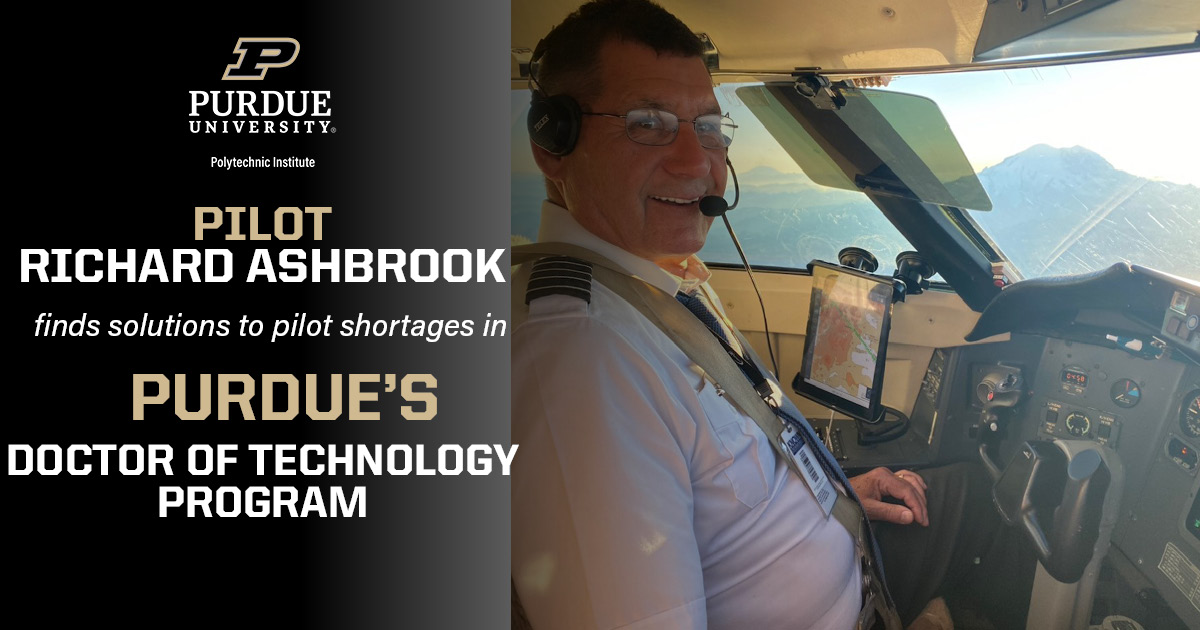For Richard Ashbrook, a typical workday is anything but typical. Ashbrook is a pilot captain who flies private jets for a charter company based out of Phoenix, Arizona. Many of his clients are celebrities, so Ashbrook has met more than his fair share of famous people. Piloting is Ashbrook’s passion – he started his flying career more than 50 years ago. He worked for United Airlines for 20 years before retiring in 2004. Afterwards, he sought a retirement career that would allow him to continue flying. When he got the call about flying private jets for a charter company, he seized the opportunity.
“In my job I’ve gotten to meet lots of celebrities, as well as other fabulously wealthy people,” Ashbrook said. “And I get to fly all over North America mostly, even going out to Hawaii – it's great fun.”
Ashbrook has enjoyed his long piloting career, but he’s concerned about the current pilot shortage straining the airline industry. He wants more young people to invest in aviation careers. That’s what brought him to Purdue.
 “My research focuses on how to combat the pilot shortage,” Ashbrook said. “I’ve experienced the shortage firsthand, and I think it’s incredibly important for young people to learn about aviation careers early on.”
“My research focuses on how to combat the pilot shortage,” Ashbrook said. “I’ve experienced the shortage firsthand, and I think it’s incredibly important for young people to learn about aviation careers early on.”
Ashbrook is currently completing his Doctor of Technology degree online with Purdue’s Polytechnic Institute. At Purdue, Ashbrook has found a community of scholars that are interested in his aviation research and appreciative of the wealth of experience he brings to the virtual classroom.
“Everyone in the program has been extremely helpful and accommodating, regardless of me not being a so-called traditional doctoral student,” Ashbrook said. “There are faculty who have extensive aviation experience, as well as students who, like me, have experience in the industry. Dr. Patankar, for one, has really supported my dissertation.”
No stranger to academia, Ashbrook had already completed three master’s degrees at Embry-Riddle Aeronautical University prior to starting his doctorate at Purdue. When researching doctoral programs after his retirement, Purdue’s Doctor of Technology program stood out because of its openness to Ashbrook’s extensive professional experience.
“Some doctoral programs are looking for younger students who are in the beginning of their careers,” Ashbrook. “But at Purdue, I really felt like my experience was an asset. They were open to all kinds of students from different professional backgrounds and at different points in their careers.”
According to Ashbrook, a highlight of Purdue’s program is getting to work with faculty who have expertise in the aviation field and getting to share professional experiences with other students. Though Ashbrook is one of the oldest students in the program, his decades of aviation experience have earned him a lot of respect.
“At Purdue you have great aviation faculty – it hasn’t been difficult finding people to research with, or people to put on my dissertation committee,” Ashbrook said. “And you also have a lot of people in the program who are interested in working in aviation, so that’s been exciting as well.”
Ashbrook also appreciates that Purdue has a reputation for being one of the top aviation schools in the country. Ashbrook associated Purdue with aviation long before he started at Purdue as a student.
“When it comes to aviation, Purdue turns out to be a huge number of pilots,” Ashbrook said. “It’s a big name.”
Purdue’s legacy of aviation excellence made it the perfect place for Ashbrook to spearhead his research, which focuses on strategies for overcoming the pilot shortage and reinvigorating the public’s interest in aviation. Ashbrook thinks that talking to young people about aviation careers when they’re in high school can help interest them in the field. He has visited high schools around the country many times to talk to young people about the benefits of becoming a pilot.
Ashbrook’s dissertation also investigates other strategies for encouraging people to go into aviation – including having airlines help pay for the costs of flight school, which can be prohibitively expensive. Some airlines have already started programs to help with flight school costs, a trend Ashbrook is excited about.
“For me, the question is: how do we make this wonderful career seem attainable to people?” Ashbrook said. “There are a lot of myths about becoming a pilot, like you must be particularly good at math or pick a certain college major. I want people to see this career as attainable.”
Ashbrook plans to be done with his doctorate in 2024. In the meantime, he is completing classes and designing research projects in the time between his private flight assignments. Once he finishes his degree, he hopes to become an instructor pilot.
“It’s a truly exciting career,” Ashbrook said. “Even after all of these years, there’s still more to learn.”

